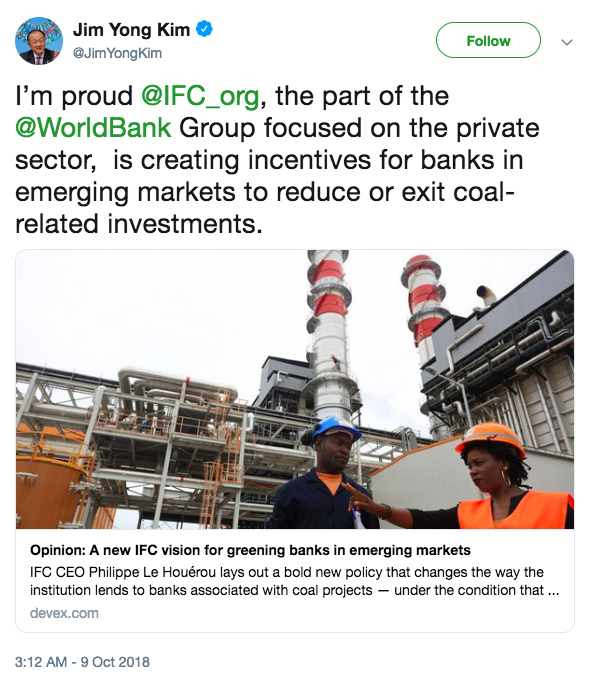The U.K. hints at a controversial plan that could reduce government funding toward official development assistance, Nikki Haley's departure from the U.N. stirs concern for already fragile U.S.-U.N. relations, and a new global hunger index highlights the link between conflict, forced migration, and hunger. This week in development:
The World Bank and International Monetary Fund annual meetings are underway in Indonesia, under the shadow of a
natural disaster that has lent somber urgency to some of the institutions' biggest priorities. While finance ministers, development leaders, and civil society advocates chart the future of multilateral development cooperation, first responders continue to deal with the aftermath of a devastating earthquake and tsunami on the island of Sulawesi that left thousands dead. The World Bank is shining a bright spotlight on the
critical role human capital plays in advancing economic growth, with a new ranking system that President Jim Kim hopes will induce a race to the top for investments in health and education. Supporters of the human capital index are encouraged by the possibility that it might compel finance ministers to look more seriously at social sector investments — and that the IMF might attach more value to public spending when it designs loan packages for countries in need of assistance. In the wake of a
startling report from the Intergovernmental Panel on Climate Change about the immediate and mounting impacts posed by a warming world, the
IFC announced on Devex a new policy to work proactively with financial institutions to divest from coal projects. Two days later, Kim announced that the World Bank will not move forward with plans to support a
controversial coal plan in Kosovo, signaling a victory for civil society activists — and a rapidly shifting economic landscape for energy access.
U.K. aid chief Penny Mordaunt announced a plan to recycle profits from its private sector investments —
a controversial move that could reduce the amount of funding the United Kingdom puts toward official development assistance. In a speech Tuesday, Mordaunt said she hopes profits made by the U.K.'s development finance institution, CDC, could be reinvested in projects in developing countries to count toward the U.N. target of spending 0.7 percent of gross national income on aid. CDC's profits are currently reinvested in development, but cannot count toward ODA under the international aid rules — meaning new funds need to be put up each year to meet 0.7 percent, which is currently only met by the U.K. and four other countries. Mordaunt hinted she would be willing to break with the rules if she cannot reach an agreement with other members of the Organisation for Economic Co-operation and Development's Development Assistance Committee to change them.
The sudden announcement of Nikki Haley's departure as U.S. ambassador to the United Nations leaves open questions about the
future of already fragile U.S.-U.N. relations, experts tell Devex. Haley announced Tuesday that she would be leaving her post at the end of 2019, after two years at the job. Her resignation was reportedly a shock to some U.N. colleagues and foreign counterparts, who
have largely regarded her work highly. While Haley did push for some hardline Trump administration priorities — including
withdrawing all funding to the U.N. Palestinian refugee aid organization — Haley was more amiable to compromise than she perhaps appeared in public, according to Richard Gowan, senior fellow and U.N. expert at United Nations University. Gowan cautioned that "it is not guaranteed that the next U.S. ambassador at the U.N. will work so closely with the secretary-general, especially if they are from the John Bolton wing of the administration."
A new global hunger report found that despite an overall 28 percent drop in hunger levels globally since 2000, conditions have worsened in many nations. A staggering 124 million people are suffering from acute hunger or starvation — an increase from 80 million two years ago — and the majority of those who die from starvation are children. The
2018 Global Hunger Index — published by Concern Worldwide and German charity Welthungerhilfe — found that 51 countries out of 119 have levels of hunger that are serious or alarming. South Asia and sub-Saharan Africa have the most alarming levels of hunger. The report stressed the link between conflict, forced migration, and hunger: "Too often, we are drawn away from any focus on root causes and toward misleading representations of a global crisis. Instead, we must work to tackle the political factors that lead to hunger and displacement, including conflict," Concern's Chief Executive Dominic MacSorley said in a statement.
On the occasion of International Day of the Girl Child, a new initiative announced this week hopes to
galvanize the U.S. wedding industry to help stop forced marriage for girls around the world. VOW will allow brides, grooms, and the businesses that cater to them to donate to underfunded grassroots organizations in six countries with a high prevalence of girls married before the age of 18. Also out today, a
new study from Plan International argues that — while street lighting and better urban planning are needed — making cities safer for girls really comes down to political leadership. Using a map-based social survey tool, the study asked female participants with an average age of 21 in Lima, Kampala, Sydney, Madrid, and Delhi to drop a pin whenever they felt safe or unsafe and explain why. The bad pins far outnumbered the good, with the survey recording 2,855 cases of verbal sexual harassment, 562 cases of physical harassment, and 847 cases involving both. The report argues that these attacks hurt development objectives. In Lima, for example, 33 participants said they stopped going to school, work, or college due to experiences of abuse and harassment.












0 comments:
Post a Comment